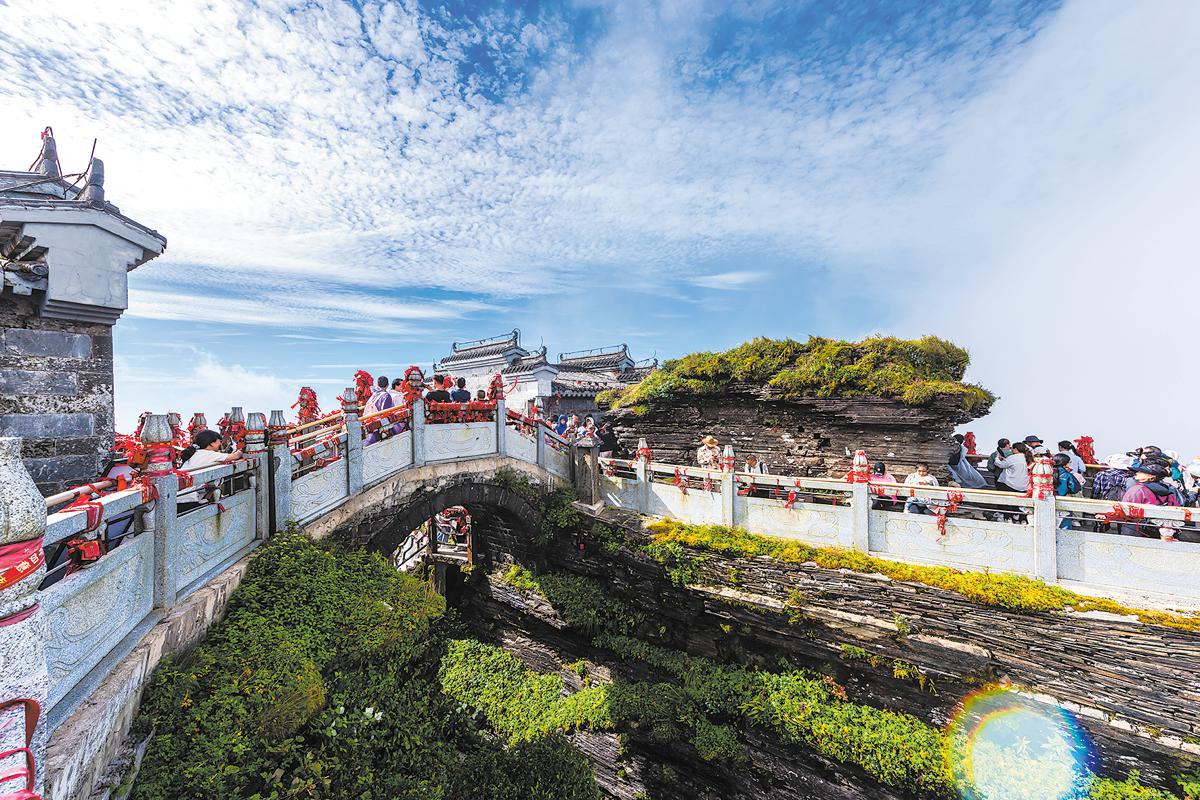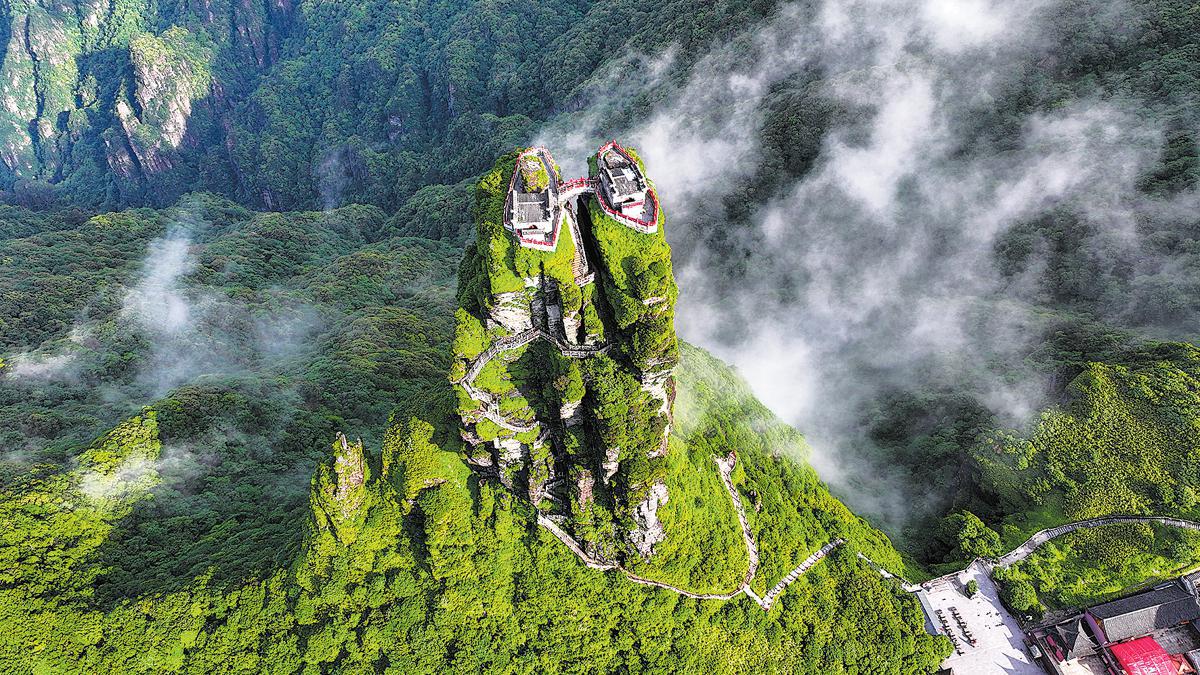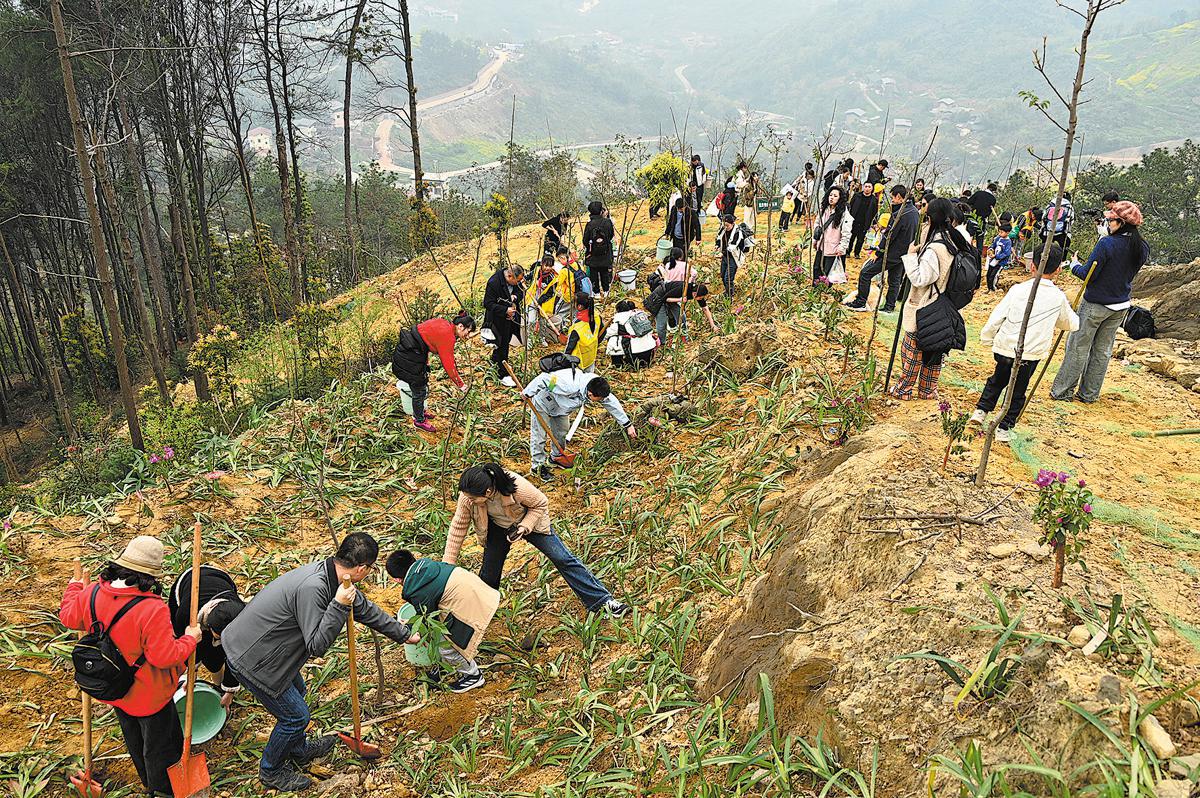Editor's note: This year marks the 20th anniversary of President Xi Jinping's proposal of the concept that "lucid waters and lush mountains are invaluable assets". China Daily will present a series of stories on how resources such as mountains, rivers, lakes, forests and farms are being transformed into priceless gifts.

Since being declared a World Heritage Site in 2018, little time has been wasted in making Fanjing Mountain in Southwest China's Guizhou province a hot spot for visitors, attracting some 8,000 per day this summer.
The 2,570-meter peak, the highest in the Wuling Range, has become a mountain of opportunities for eco-tourism and locals keen on using Fanjingshan, as it is known in Chinese, to their benefit.
While famous for its Buddhist temples and biodiversity, Fanjing Mountain has provided locals with opportunities to work in their hometowns instead of having to look further afield.
"The beauty of Fanjing Mountain has given us a precious opportunity to remain in our hometown and build a livelihood here," said Liu Yan, 30, director of the Fanjing Mountain scenic area.
With a geological history stretching back 1.4 billion years and a well-preserved ecosystem home to more than 7,900 species, Fanjing Mountain scenic area employs hundreds of staff, from environmental scientists to forest rangers.
Turning green into gold
"Previously, the mountain's rich natural heritage remained largely untapped. In the past few years, we've been striving to leverage the natural gift to develop an economic edge," said Wan Qianyou, deputy director of the ecology and environment bureau in Tongren city, where the mountain is located.
In August 2005, President Xi Jinping, then secretary of the Communist Party of China Zhejiang Provincial Committee, proposed the concept that "lucid waters and lush mountains are invaluable assets" during a visit to Anji county in the province.
The concept underscores the equal importance of environmental protection and economic development, emphasizing their potential for mutual reinforcement. Over the past two decades, it has served as a guiding principle for sustainable development across China.
According to Wan, the development of Fanjing Mountain in recent years exemplifies this approach, converting ecological wealth into tangible economic benefits. Tourism has unlocked the mountain's ecological value as homestays, restaurants and other services have sprouted around its base. As a result, from 2019 to 2023, the scenic area attracted 6.25 million visitors and generated 1.22 billion yuan ($170 million) in tourism revenue.
ALSO READ: Guizhou mountain recognized by IUCN for conservation efforts
Last year, Fanjing Mountain welcomed 1.97 million visitors, a 7.2 percent increase from 2023, setting a new record.
"Those who lived and farmed on the mountain were relocated not far away a few years ago. This connected them with modern industries, so they now have more job opportunities and significantly higher incomes," Wan said.
Director of the scenic area, Liu, decided to come back and work in her hometown and has been employed in the scenic area for over a decade. Most of her colleagues, including tour guides, sightseeing vehicle drivers and cleaners, are also from local communities.

Yang Shengwen, 50, is a local guide. A resident of the foothills, he has worked on the mountain for over 20 years and earns around 5,000 yuan per month.
"Twenty years ago, only a few hundred people climbed the mountain each day due to poor transportation," Yang said. "Now, as the scenic area has become more popular and transportation infrastructure has been upgraded, we have more visitors and higher incomes."
Yang Changfang, deputy general manager of the Fanjing Mountain Culture and Tourism Group, said tourism at Fanjing Mountain has continued to soar, with annual revenue in 2024 increasing by 50 percent year-on-year.
"A complete tourism industry chain has taken shape, from ticket sales and mountain services to accommodation and catering at the base," he said.
The region's well-preserved environment has also attracted industries that depend on pristine natural resources. About a 40-minute drive from the mountain, Gui Tea Group, a Guizhou-based tea producer, sources tea leaves from local farmers and has established the world's largest matcha production base in the region, exporting its products to over 50 countries and regions worldwide.
"We produce clean, high-quality tea that meets international agricultural standards," said Zhong Jin, director of the group's general manager's office. Before selecting planting bases, the company conducts rigorous tests on local environmental factors such as soil quality. "The region's ecological strengths provide us with premium raw materials for matcha production," he said.
Persistent protection
Behind the awe-inspiring scenery, continuous efforts are being made to protect the environment and biodiversity of Fanjing Mountain, which is also designated as a national nature reserve.
Despite the mountain's growing popularity, the scenic area enforces strict limits on visitor numbers through an online booking system. Local authorities have also released a series of regulations to protect the environment and its biodiversity.
According to Li Haibo from the mountain's management bureau, sightseeing routes are carefully planned to shorten visit durations and minimize human interaction with wildlife. "The scenic area encompasses only a small portion of the mountain," he said. "With transportation options like cable cars and shuttle buses, tourist movement has a limited impact on the broader natural environment."
ALSO READ: Experiencing Guizhou's wild beauty
Yang, the general manager, added that the scenic area plans to introduce electric vehicles for tourist transport to further reduce emissions. Fire prevention measures have also been enhanced, and wastewater treatment facilities have been installed.
"Visitors can enjoy the beauty of nature while leaving behind only the lightest footprint," Li said.
With 97 percent forest coverage, the mountain is home to a rich diversity of plant and animal species, including monkeys, bears and snakes. Among them, the Guizhou golden snub-nosed monkey is a rare and endangered species, with Fanjing Mountain serving as its only habitat in the world.

Some 850 Guizhou golden snub-nosed monkeys live in the area.
"When the nature reserve was first established, we realized that the mountain area had become isolated from the surrounding ecosystems," said Shi Lei from the mountain's management bureau. "To address this, we built ecological corridors to help wildlife reconnect with the broader natural environment."
Regular environmental monitoring is conducted in the region, tracking indicators such as air quality, water quality and biodiversity, according to Wan. Since 2018, 37 new species have been identified on the mountain. "Without the protection of the mountain's original forests, we cannot discover these new species," Li said.
Fanjing Mountain is also renowned for its pristine water resources, with all surface water in its core area meeting Grade I, the highest level in China's five-tier surface water quality system. Nongfu Spring, the country's largest bottled water supplier, also sources water from the region. In 2024, the output of its local facility surpassed 1 billion yuan, Wan said.
Sustainable future
Some 320 kilometers to the northwest of Fanjing Mountain, Jinyun Mountain in Chongqing municipality has also been attracting a large number of tourists with its picturesque scenery. However, before 2018, unchecked construction was rampant on the mountain, with illegal buildings and numerous unauthorized agritourism facilities scattered across various locations.
Such unchecked development presented a significant threat to the habitats of over 2,000 plant species and 1,300 animal species on the mountain, as highlighted by the authorities of Beibei, a district of Chongqing where Jinyun Mountain is located.
ALSO READ: Tongren is home to Nuo experiences
In 2018, the Beibei government initiated a campaign to tackle the issue. This led to the demolition of all illegal buildings on the mountain, totaling 620,000 square meters in floor area, and the rectification of 269 cases of environmental violations. As part of efforts to restore the damaged ecosystem, a total of 775,000 plants were planted.

Thanks to the efforts, the forest coverage of Jinyun Mountain increased to 98.6 percent in 2024, compared with 94 percent in 2017. Meanwhile, the concentration of negative oxygen ions per cubic centimeter rose from 1,100 to 1,708 during the period.
Liu Hao, a native of Jinyun village, once dreamed of permanently departing his hometown due to its isolation from the outside world. He never envisioned participating in the management of his family's homestay, dismissing it as "low-end" and situated in a "subpar environment".
Nevertheless, following the announcement of a renovation initiative aimed at enhancing the homestays in the village six months ago, the 29-year-old made the decision to return and assume responsibility for the homestay.
As part of the initiative, the Beibei district government hired professional designers to provide tailored design solutions for villagers looking to upgrade their homestay facilities.
The upgrade proved to be a success. Though the number of guest rooms in his family's homestays was reduced from 12 to eight, the price per room per night has risen to 500 yuan from merely 100 yuan, Liu said.
"Our rooms are always fully booked on weekends and holidays. During peak seasons, tourists usually need to book one or two weeks in advance to secure a room," he added, noting that their income has more than doubled.
Jinyun village, which had experienced a population decline for years due to the migration of young residents, has seen a positive shift. At least five young individuals have returned from work elsewhere to manage their upgraded homestays, according to the Jinyun village committee.
READ MORE: Guizhou slated to get new national park
In light of his hometown's significant environmental and economic transformation, Liu now possesses a steadfast determination to remain rooted at home.
"I will never leave it again," he said.
Contact the writers at lishangyi@chinadaily.com.cn


